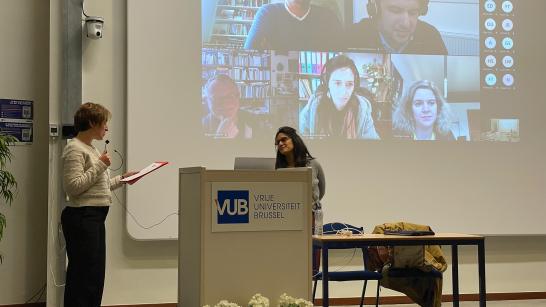
We are pleased to announce that on 21 November 2022, Sibel Top successfully defended her PhD thesis entitled: “The political offence exception clause to extradition in Europe: An analysis of its evolution and application with a special focus on the Catalan independence crisis”.
After her presentation, Sibel answered questions from the jury which consisted of Prof. Ilke Adam, Dr. Emmanuel-Pierre Guittet, Prof. Kristin Henrard, Dr. Julia Jansson, Prof. Valsamis Mitsilegas and Dr. Angela Tacea.
After that, Sibel’s PhD Promotors Prof. Paul De Hert and Prof. Florian Trauner gave a speech reflecting on their collaboration with Sibel over the years.
Finally, the PhD defence was concluded by Sibel’s speech in which she thanked her supervisors, members of the jury, family and friends, for their support.
The Brussels School of Governance would like to congratulate Dr. Sibel Top on this wonderful achievement. Below you can read more about her PhD thesis.
Abstract
This research examines the evolution and current application of the political offence exception clause to extradition in the European context. The political offence exception is a clause traditionally found in extradition treaties that aims to protect people who fought for democratic and liberal values from extradition to a country where they may not get a fair trial. However, in the European institutional context (Council of Europe and European Union), the protection granted to political offenders has been progressively diminished because of the similarity of political regimes of European countries. It was indeed considered that, in a framework where mutual trust prevailed among partner countries sharing similar values, there was no need to uphold this type of protection. In an unexpected turn of events, however, the Catalan independence crisis, the subsequent self imposed exile of some of the Catalan leaders to other EU and Council of Europe countries, and the systematic refusal of European partners to surrender Catalan leaders to Spain turned all previous certitudes on the obsolescence of the clause around. The discomfort of European partners to surrender Catalan exiles to Spain came, first, from the fact that the Catalan project - albeit illegal, had democratic ambitions; and, second, from the severe reaction of Spanish authorities to the process that did not appease emerging questions about their ability to provide a fair trial to Catalan leaders. Using Bourdieu’s theory on state creation as its prism of analysis, this work scrutinises the shrinking protection of political offenders in the Council of Europe and European Union contexts to understand the dynamics at play behind this evolution. Looking at the specific case of the Catalan independence crisis, this research argues that a form of ‘ghost political offence exception’ has been applied by European countries to the case of Catalan leaders.